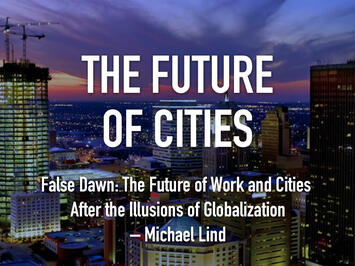
“The future ain’t what it used to be,” Yogi Berra famously observed. Nowhere is that truer than regarding the future of work, particularly in cities. The economic disruption of the COVID-19 pandemic, partial de-globalization driven by Sino-American geopolitical rivalry, and the collapse of the asset bubble that triggered the decade-long Great Recession of the 2010s — all these trends have shattered the orthodox neoliberal narrative of the 2000s about the future of the American workforce, without replacing it with a new consensus.
This book is being published as a series, with permission of the American Enterprise Institute. Each week a new chapter will be published, with links to each chapter.
Click or tap a link below to read or download each chapter. (PDFs open in new tab or window)
False Dawn: The Future of Work and Cities After the Illusions of Globalization – Michael Lind (new this week)
Michael Lind is the author of The New Class War: Saving Democracy from the Managerial Elite (Portfolio, 2020) and Land of Promise: An Economic History of the United States (HarperCollins, 2012), among many other books. A former editor or staff writer at the New Yorker, Harper’s Magazine, the New Republic, and the National Interest, he is a fellow at New America and a columnist for Tablet and has taught at Harvard University, Johns Hopkins University, and the University of Texas at Austin.
Read the Series:
Introduction: Welcome to the Urban Future – Joel Kotkin
I. The Big Picture for Global Geography
American Aspiration is Metropolitan – Ryan Streeter
The Urban Future: The Great Dispersion – Wendell Cox
The Future of the Big American City is Not Bright – Samuel J. Abrams
II. The Variety of Urban Experiences
The Future of Chinese Cities – Li Sun
Africa's Urban Future – Hügo Krüger and Bheki Mahlobo
Recalibrating Expectations: Lessons from Youngstown, Ohio – Sherry Lee Linkon and John Russo
The Texas Triangle: An Emerging Metropolitan Model in the Lone Star State – J. H. Cullum Clark
The Evolution of New York City Politics – Harry Siegel
III. The Policy Agenda
Housing Unaffordability: How We Got There and What to Do About It – Tobias Peter and Edward J. Pinto













build back
After bemoaning prospects for the non-elite, the author suggests work in the medical-industrial complex. Alternatively, the WSJ today reports a vast shortage of "talent" in non-residential construction, including supervisorial jobs. But you do have to report reliably (and early) to building sites...